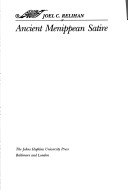Although the term "Menippean satire" was never used in antiquity to name a distinct literary genre (the term was coined in the 16th century), it has come to describe a vast body of world literature - from Erasmus and the Humanists to Pabelais and Swift, from "Moby Dick" to "Alice in Wonderland" and "Ulysses". The text is invoked to explain the origins of the modern novel and to categorize forms of prose fiction that are not essentially novelistic. This book charts the history and development of this ancient genre. The author demonstrates its unity as a Greco-Roman phenomenon, describes its different branches, and shows the continuity of the genre into late classical and early Christian times. He also discusses the theories of the genre set forth by Northrop Frye and Mikhail Bakhtin and presents a detailed definition that respects the particularities of classical texts. In chapters on the fragments and testimonia relevant to Menippus and Varro, Relihan shows the specific Greek origins of the genre and its transformation in Roman hands.
Subsequent chapters offer readings of Seneca's "Apocolocyntosis", Petronius, Lucian's "Necyomantia and Icaromenippus", Julian's "Symposium", Martianus Capella, Fulgentius's "Mythologies", and Ennodius's so-called "Paraenesis Didascalica". Boethius's "Consolation" is dealt with in the conclusion, which looks ahead to the Menippean satires of the 12th century. Three appendices discuss the relations between Menippean satire and the recently discovered fragments of Greek prosimetric fiction, and offer annotated translations of the text of Ennodius and of Fulgentius's "Prologue".
- ISBN10 0801845246
- ISBN13 9780801845246
- Publish Date 1 August 1993
- Publish Status Out of Stock
- Out of Print 22 June 2002
- Publish Country US
- Imprint Johns Hopkins University Press
- Format Hardcover
- Pages 344
- Language English
